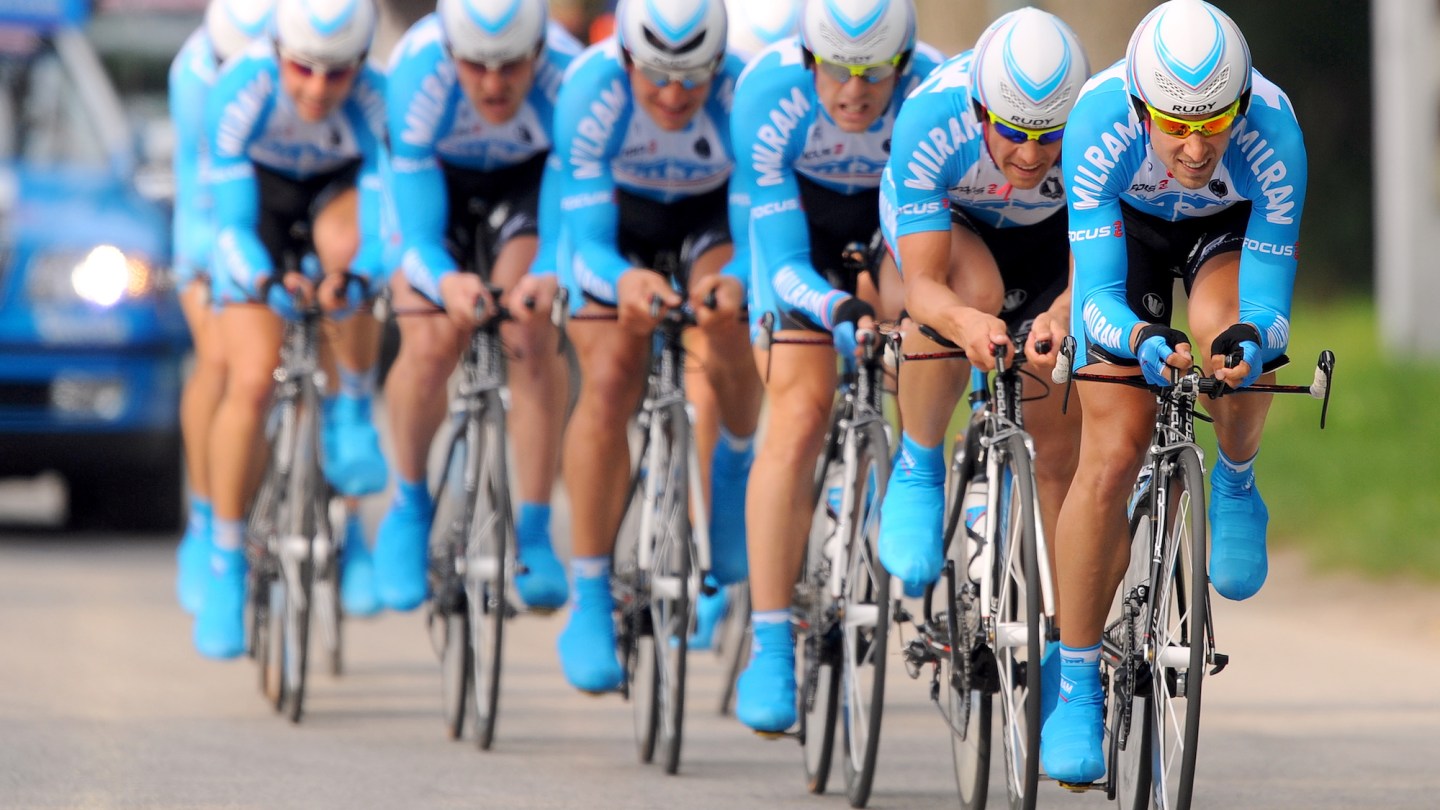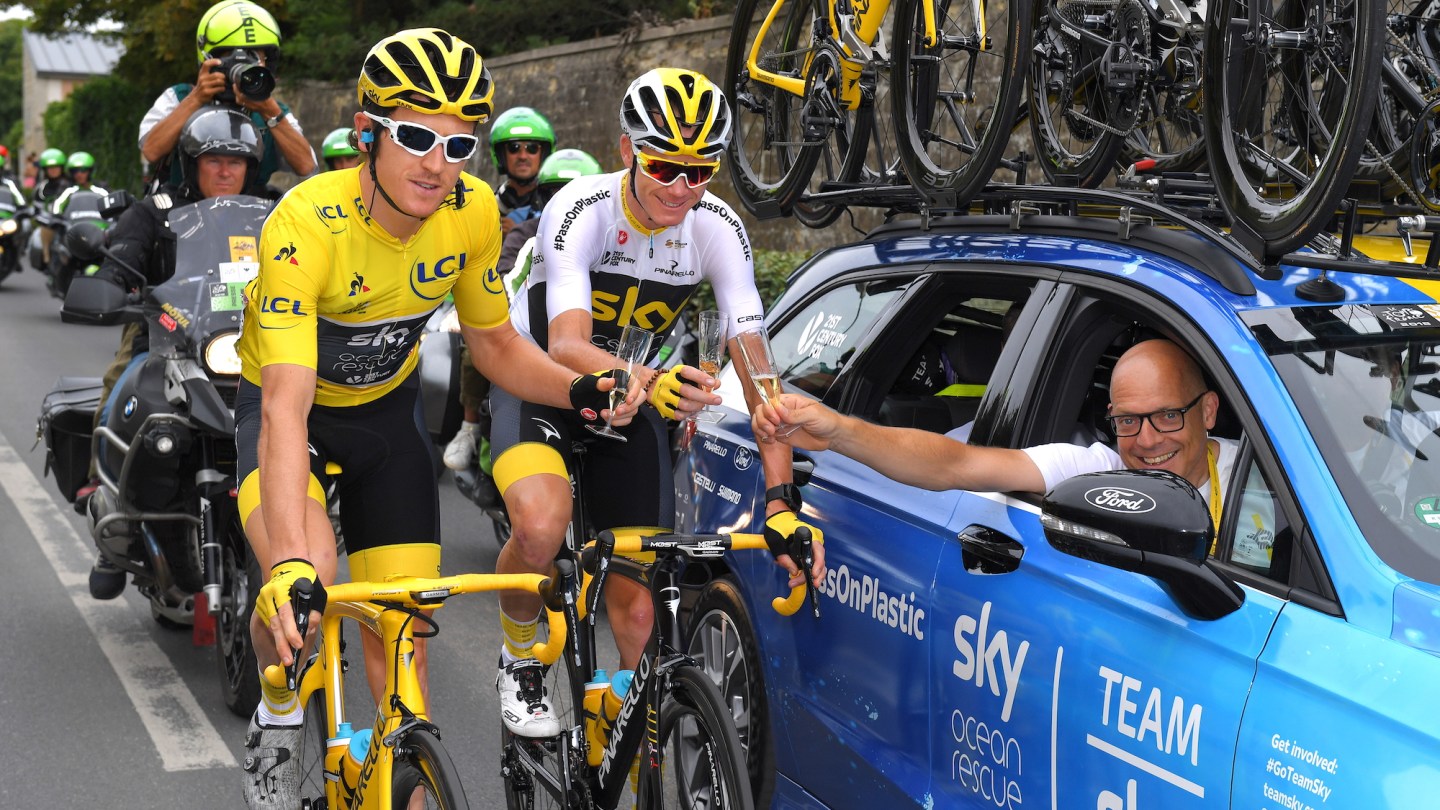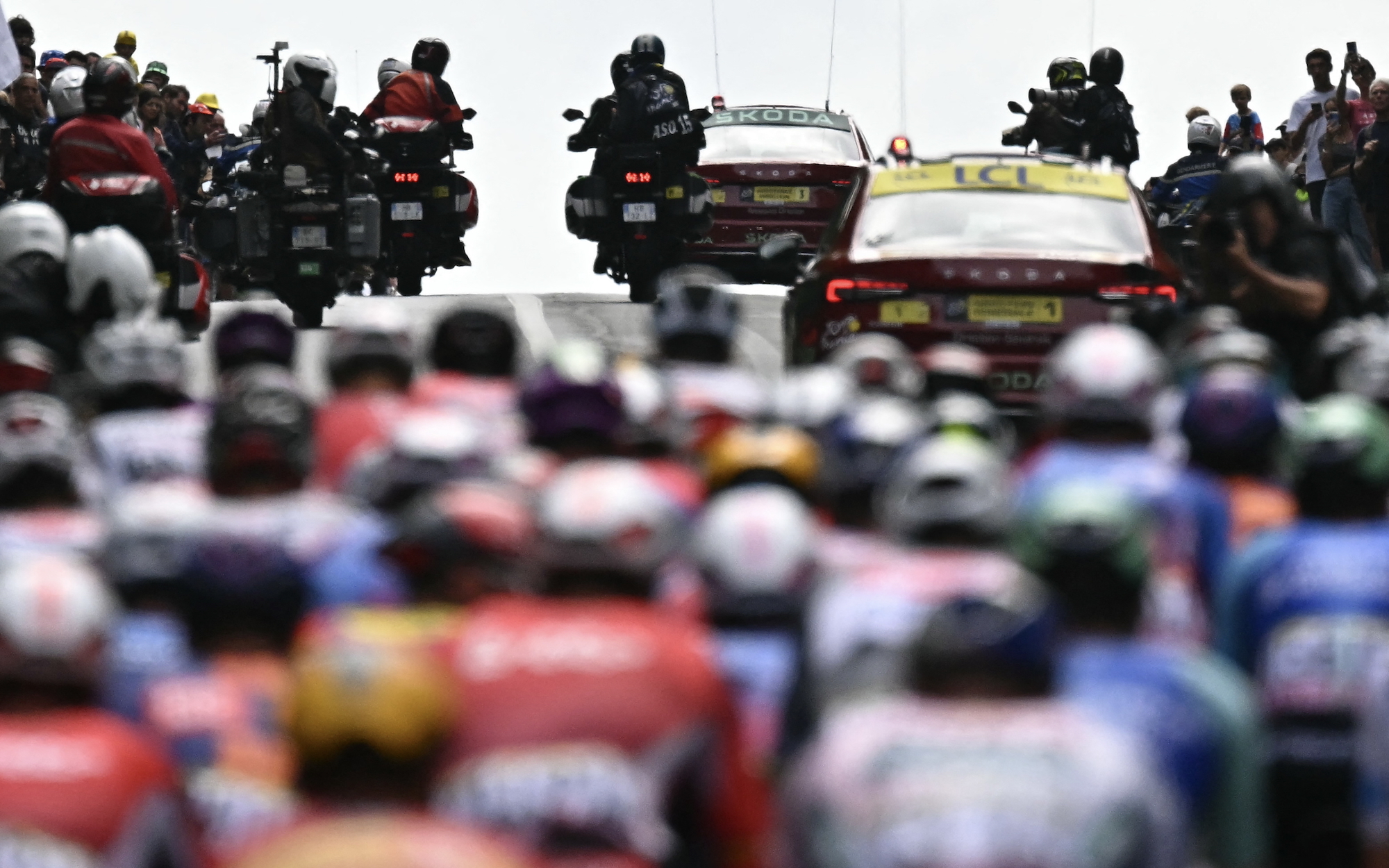MONTPELLIER, France — Fifteen stages and two rest days into the Tour de France, the talk of the press room is not Tadej Pogacar rampaging toward his fourth yellow jersey, brave Kevin Vauquelin trying for an unlikely top-five finish, or Jonas Vingegaard's absurd time-trial helmet. The story that has everyone buzzing concerns events that happened 13 years ago. It is interesting in substance, though its form is the aspect that demands attention. What may seem at first blush like a straightforward story about someone breaking the rules in a different era of cycling is in fact a neat encapsulation of the fraught dynamics between power, media, and performance in cycling; the tension between cycling's dirty past and its supposedly clean present; and the necessity of squaring the two eras.
The story begins in February 2019, when Austrian cross-country skier Johannes Dürr blew the whistle on a German physician named Mark Schmidt, accusing the latter of running a systematic blood doping ring. Schmidt had previously worked for the scandal-plagued Milram and Gerolsteiner cycling teams; in 2009, Austrian cyclist Bernard Kohl had accused him of running doping practices for those teams, though he didn't face any consequences until the Dürr revelations. The investigation came to be known as Operation Aderlass, German for "bloodletting."
Cops investigated, and Schmidt was convicted and given a four-year, 10-month sentence in January 2021. The list of associated athletes grew to 22, with several prominent former cyclists either confessing or being implicated, including decorated sprinter Alessandro Petacchi. A German outlet reported that the managing director of the Bahrain–Mérida team, Milan Erzen, had asked Schmidt for help setting up some blood doping for his team. Erzen denied involvement, but he still runs a top-level cycling team, a useful illustration of the reality that the sport having moved into a cleaner era doesn't preclude the involvement of people with shady pasts.
Which brings us to the 2025 Tour de France. A few weeks before the race, German outlet ARD reported that prosecutors had investigated and ultimately declined to pursue sanctions against or name "up to 20" people who'd been involved to some degree with Schmidt, mostly on the cycling side. One of those people reportedly still "holds an important position" with Ineos–Grenadiers, the successor of Team Sky. ARD published 2012 text messages allegedly from the staffer to Schmidt reading, "Do you still have any of the stuff that Milram used during the races? If so, can you bring it for the boys?"

At this point, the necessity of taking this story seriously is as clear as it is complicated. Milram disbanded after 2010, which was Team Sky's first season in the peloton. You can read the handoff between the two teams as a metaphor for the transition from one era to another. In the popular understanding of cycling, the former team is synonymous with the tail end of cycling's dirty era, while the latter is the first dominant team of the biological passport era.
When Dave Brailsford launched Team Sky in 2010, he boasted of a zero-tolerance policy for formers riders or staff connected with doping. For a sport then more than a decade into a nonstop, overlapping series of doping controversies, this offered a basis for hope—and became one of the foundational myths of the current, theoretically much cleaner era. Anywhere it cracks is worth looking at closely.
It is also hard to do. Several reporters have been the subject of high-profile lawsuits on behalf of accused cyclists and teams, and even the Union Cycliste International (UCI), the sport's global governing body. This is not a cycling-specific phenomenon either, with tennis, baseball, and swimming stars all having filed—and in some cases won—defamation cases against reporters, news outlets, and officials for accusing them of doping or even just reporting on their links to doping. Reporting on doping often necessarily has to stop short of definitive proving anyone's involvement, since so much of the evidence is indirect: a meeting with a disgraced doctor here, a bunch of medical waste discovered there.
Another complicating factor is the composition and polyglot nature of cycling's press corps. The original ARD report was in German, just as the original reports on 2006's Operación Puerto doping scandal were in Spanish. If you are trying to amplify and build upon the ARD story, you first have to be careful that you have translated the fine nuances of the report correctly; a missed "allegedly," and you could be toast. It is not always clear how credibly one should receive different sources publishing in different languages and media environments. ARD is a German public broadcasting group and is known to be a serious concern, but what if something interesting pops up at Austria's Kleine Zeitung?
On Tuesday, July 15, Irish journalist Paul Kimmage named David Rozman as the Ineos staffer implicated in the ARD leak. At that point, most of the press room was either indifferent to or simply unaware of the story. I have been spending my time in France with people from the Escape Collective website, who have been all over this story but have had to tread with caution (another illustrative tale about the ersatz, multilingual character of the Tour press corps: Escape got the scoop on Remco Evenepoel leaving QuickStep, only for access-thirsty Belgian outlets to cover it as rumors that they already knew about, without giving Escape any credit). Escape Collective is incorporated in Australia, which has much stricter libel laws than the United States, so the Escape reporters had to wait until the Times of London published Rozman's name before they could do so themselves—or even say it on their podcast. Most of the non-Anglophone press was not interested in, aware of, or willing to wade into the story until Escape pressed Ineos hard enough for the latter to issue a statement, after which L'Equipe and the Times picked it up.
As for the confrontation: Escape's Jonny Long was part of a small group of reporters who cornered Brailsford outside the Ineos bus after Stage 10 to ask whether, as rumored, Rozman was here at the Tour. Brailsford, who never shied away from the press during Sky's glory years, got pissy with them. "Did you hear what I just said?" Brailsford said. "I won’t be commenting." He then stomped away, muttering, "Fucking hell, guys, come on."
Getting yelled at is part, but not all, of why cycling reporters don't enjoy writing doping stories. Beyond the Damoclean threat of legal action, it is murky business that raises troubling questions about the very foundations of the sport.
The message from the cycling world is not only We are clean now—only one prominent rider has tested positive this decade—but also, so stop asking us about it. The second clause there all but demands scrutiny on the first. In other words, doping stories are only as valuable as the doubts they provoke about every other part of cycling. While enthusiasm for any sport involves some degree of cognitive dissonance, beyond a certain point, willingness to believe tips over into unwillingness to learn.
Managing this tension is the responsibility of the press corps, even if it's been extremely disincentivized as of late. There are a lot of ways to cover the Tour de France; doing a doping story is the stickiest and most unpleasant. TV reporters are given preferential access to riders, a fine exchange for all involved because both parties are guaranteed to stick to the script. They're both part of the show, after all.
More than almost any other major sport, cycling is a media production. Teams do not get their money from TV deals, ticket sales, or merch, but from sponsors who buy in to get their logo into friendly televisual coverage. It is a sport built on marketing, the natural enemy of journalism. Of course there is an incentive for everyone involved to keep the party going and an aversion to anything that casts doubt on the sport's foundations.
The primary offering of the Brailsford's public-relations campaign at the launch of Team Sky was freedom from that doubt. Sky won the 2012 Tour de France—the team's first—a little more than two months before the USADA issued its 200-page reasoned decision on stripping seven Tour victories and an Olympic medal from Lance Armstrong, and reaffirmed its commitment to zero tolerance in the report's wake. Every rider and staffer had to sign a pledge that they'd never been involved in doping, which resulted in a sports director and a coach leaving. "It was important to stick with the policy," Brailsford said at the time, "but we have to go through some pain, some short-term pain. We were willing to take a short-term hit on performance to get where we wanted to be for the long term."
Sky experienced no short-term pain, as Bradley Wiggins' 2012 Tour win paved the way for a decade of dominance, mostly by Chris Froome, who won in 2013, 2015, 2016, and 2017. Team Sky boasted of its superior scientific approach to the sport, a sly way of implying not only that its riders had won without doping, but that they were ushering in a new era in which legitimate science could approximate the gains made by injecting erythropoietin (EPO).

Above all this was marketing, and like most marketing it was largely fiction. For one, the 2016 Fancy Bears Russian hacking effort showed that Sky was pioneering the use of therapeutic use exemptions (TUE) in order to gain permission for its riders to take a series of otherwise prohibited asthma-fighting corticosteroids. Months after that revelation, British Cycling announced an investigation into an incident from before the 2011 Tour in which a courier had hand-delivered Wiggins a package containing some sort of mysterious medical something-or-other in a jiffy bag. In response to questions about the bag's contents, Brailsford tried out two different lies, then tried to buy the Daily Mail's silence in return for a juicier tip. A parliamentary investigation found that the TUE stuff was purely for performance gain, not medical need—though the investigation was also notably hampered when team doctor Richard Freeman used a screwdriver to destroy a laptop full of evidence.
These stories are interesting less for their particularities—Brailsford would always deflect, characterizing each incident as an individual action rather than anything systemic—than for what they show in the aggregate. In turn, the question of Sky's dirtiness is less interesting than the lengths the team went to in order to maintain the public fiction that it was leading cycling into a new, cleaner era. The ongoing Rozman story cuts to the heart of that fiction.
A soigneur texting a convicted blood-doping doctor about "the Milram stuff" is certainly suggestive, even if it does not prove anything. Rozman was Froome's personal soigneur, beginning in 2012; once the story broke, Froome deleted several tweets mentioning him. A notable change in Brailsford's temperament, now that he has returned from helping to ruin Manchester United, is his refusal to talk about this story.
Ineos keeping Rozman around amid all the team's boasting about changing the sport for the better shows why the hard questions have to be asked. The team's statement was nothing more than a boilerplate acknowledgement, which is fairly insulting. Do they expect that the story's sheer unpleasantness will keep journalists from digging?
It's not just the public that suffer for the information blackout; Ineos's riders do too. In Saturday's Stage 14, Ineos climber Thymen Arensman took the biggest result of his career, winning atop Luchon-Superbagnères. Afterward, with an unusual delay getting Arensman in front of reporters, came an unheard-of insistence from a press officer of the Tour's organizers, the Amaury Sport Organization (ASO), that journalists ask "no non-racing questions"—an obvious effort to head off discussion of the Rozman story that had the effect of prompting everyone to ask Arensman non-racing questions. The ASO officer then asked the assembled reporters to identify themselves; a disembodied hand appeared on the other side, photographing the press corps.
The second question Arensman faced, from Julien Prétot of the Reuters agency, was prefaced with an apology: Prétot expressed his disappointment that Arensman had been put in position to have to deal with this, and then asked him simply if he had seen Rozman at the race. Arensman sat silent for roughly eight full seconds, before saying, "Yeah, I've no idea about this. You have to ask management, to be honest."
Dogged freelancer Chris Marshall-Bell followed up by asking Arensman, "Do you think it's fair that you're celebrating the biggest result of your career and the journalists are having to ask you what's going on?" It was a smart question, one that got Arensman to deliver the money line: "Yeah I don't know, weird that they don't really answer you." The simplest read on this is Brailsford having hoped that a watery, useless statement would dissuade journalists from following up too strongly, and that the emotional stakes of Arensman's career-defining victory would prove more appetizing to cover than the biggest and ugliest story of the Tour. Management is more or less using Arensman as a human shield, as a reward for the greatest achievement of his professional life.
I find the silence from leadership to be the most disturbing part of this story. Cycling is not far removed from an era so dirty that the sport barely survived. That sport lives on the enthusiasm and passion of its fans and audience members, which are totally impossible to sustain if those audience members perceive that they are being treated to a farce. It is necessary, then, for teams and riders to be transparent and honest, and do the hard work of actually committing to cleaning up the sport rather than offering platitudes and excuses for why so many people with dirty pasts are still around and face no scrutiny.
The sport is undoubtedly cleaner, but as long as people associated with doping are welcome in the peloton and not held to account, fans who put their whole heart into it are asking to get burnt. The whole apparatus runs on trust, more so than any other sport I have ever been close to; silence and evasion, in that light, are tantamount to brinksmanship. No other story at the Tour has stakes to match it.






